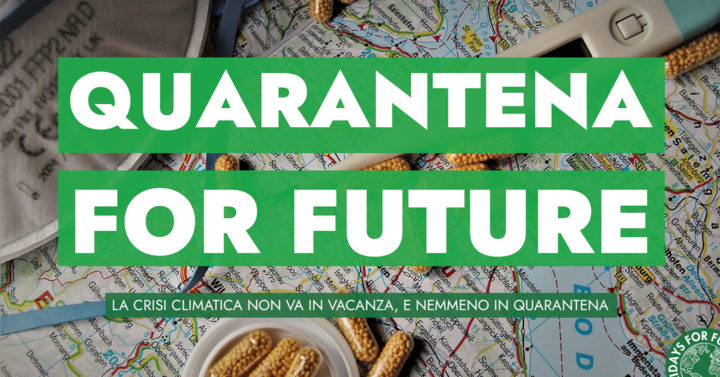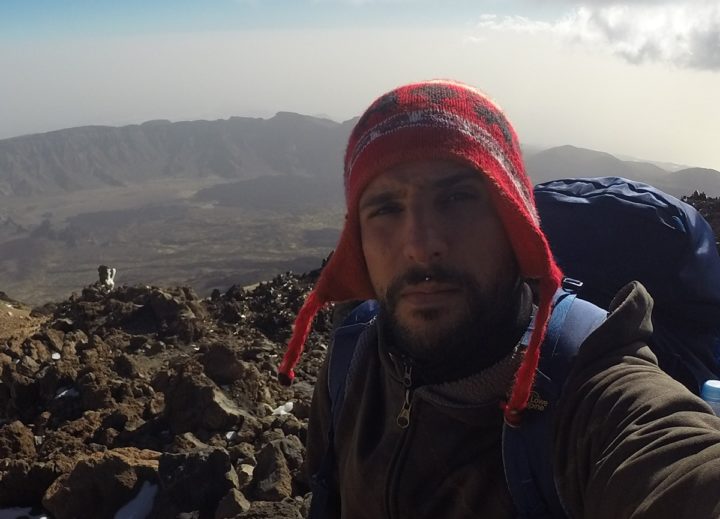Coronavirus, climate and environmental emergency, the role and perspectives of climate movements. We talk about it with Andrea Ascari, activist of Fridays For Future, Milan.
The climate emergency has disappeared from public debate and the mass media. The only issue is the coronavirus. What can we do to bring the climate back to the forefront now?
The coronavirus emergency is an expression of the climate and environmental emergency, even if it is not presented as such. What we can do is to highlight this interconnection between the two emergencies, trying to carry out a thinking model that considers each event or expression as the result of different factors and which therefore cannot be understood unless we also understand the factors that caused it.
Those who recognize the link between the coronavirus emergency and the climate emergency must commit themselves to spreading the necessary information to allow more and more people to connect the two phenomena. We must break through that wall of collective psychosis that this pandemic has generated, accompanying scientific information with philosophical knowledge, with a proactive attitude and providing the prospect of a better world for all, which can only arise from the sum of the small actions of each individual.
The next global climate strike was scheduled for 24th April. Has it all been cancelled, or will there be virtual events?
The demonstration has been cancelled, because obviously we cannot go back to the squares so soon, with the big numbers of participants of last year’s demonstrations, although in theory by the 24th April preventive restrictions should relax a bit. However, we cannot afford to stand still and we are therefore organizing an online strike, looking for and experimenting with an alternative communication, one that has an impact and that renews people’s attention to the climate issue and the environment. These are intense weeks, because we are trying to organise ourselves in Italy at a national level to pursue a common strategy for that day. There are many proposals from various local groups for the construction of this day, but the difficulty lies in making people feel that they are participating in a world event by being locked in their homes, seeing what is happening outside through the screen of their mobile phones.

How do you judge the measures taken so far by the Italian Government with regard to climate change and what do you think should be done once the health emergency is over?
I am very disappointed by the total absence of measures taken by our government to tackle climate change. After last year’s demonstrations they promised special attention to the environment and the climate, but in fact they remained empty words: the new financial measures of the government confirmed 474 million Euros of incentives for fossil fuels, which will go mainly to Eni and Edison, which is much more than what our country should receive from Europe for the Green New Deal. In addition to financing activities related to fossil fuels, major unnecessary works such as high speed railway lines, the expansion of road infrastructures and, more generally, land consumption continue: all counterproductive activities, which further worsen the condition of this planet that hosts us and allows life. If our health system has gone into crisis because of something invisible, I wonder how we will manage the intensification of extreme climate events and all that comes with it. That is why we will have to work to restore the public health system to the resilience it had in the past, transferring the resources that have been allocated over the last 40 years to private health care – which is efficacious only for those who can afford it – to the protection of the health of all, without distinction, committing ourselves to erasing the corruption typical of individualistic and greedy capitalist thinking.
What link do you see between environmental disaster and coronavirus?
I see a connection that science has somehow managed to explain: the continuous expansion of man at the expense of the environment and other forms of life has affected those few spaces that still remain immaculate and constitute the habitat of animal species with which we rarely come into contact. When this happens, a “spillover” of viruses can occur from one species to another. The other link is maybe more philosophical: if we consider the totality of life that inhabits our planet and the relationships that exist between different forms of life, the virus is a sort of reaction that aims to restore a balance. The Earth has seen an evolution of billions of years, in search of a balance that can only be achieved when each of the parts present is in symbiosis with the others. When one part tends to prevail over the others, natural mechanisms for finding this balance are triggered.
A more personal question: how did you react to this destabilizing situation caused by the health emergency? How do you spend your days indoors?
I must say that it has been, and still is, quite hard. Normally I’m always out and about on my bike, trying to get as much contact with nature as possible, and being closed indoors is a constraint I wasn’t used to. But I keep trying to see the positive side in this too: at least I’m not a victim of the virus. I spend my days working part-time as a software developer, which is the activity that allows me to support myself, and then spending the other half of the day doing what I like or think makes sense beyond myself. I’m trying to read as much as I can and keep my commitment as an activist, I exercise (not too much) and try to plan my post-coronavirus life.
A note of optimism? How can climate movements influence strong action on climate change without waiting for disaster?
I think optimism requires an active effort to be born and grow; it is a seed that must be cultivated. In these weeks of social distancing we are learning how necessary it is to focus on small things we think are due and I hope that this awareness will extend to the climate change issue. I see love growing in this difficult situation, even if the media are trying to pit us against each other with the hunt for the anointing and blaming the individual, but love could be the right driving force to make more and more people aware.
The culture of hatred cannot go on, because it only slows us down in this unbridled race against time. The climate movements know this, because love for the Earth is the basis of their struggle and they are slowly converging into a single river of people increasingly determined to safeguard life on this planet. The different perspectives of environmental and climate movements born in recent years allow more and more people to find their place in this battle, according to their beliefs and the strategies chosen to achieve results. This awareness can only grow, because the failures of our “development model” are now visible even to those who persist in not seeing them. As awareness grows, so will the results we can achieve, until even the last obstacle falls and we can truly live in harmony with the planet and the other living beings that inhabit it.
Translation from Italian by Thomas Schmid










